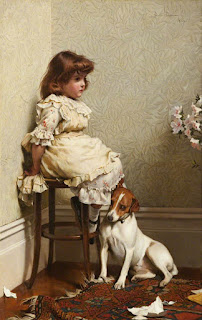Shame, Compensation Culture, Parenting and Facebook Nonsense
Modern Thinking
Shame
 |
In Disgrace, Charles Burton Barber (1845-1894)
Photo Credit: Lytham Art Collection of Fylde Borough Council
[CC BY-NC-ND] |
…Nowadays if it’s shocking enough the culprit will get offered his own chat show on television.
(John Humphrys, Devil’s Advocate)
You were given a set of moral values when you were a child. You were taught the difference between right and wrong and when you transgressed, as we all do, sometimes shame followed. Now, it’s a strange old
world where, perhaps, the same values are not transmitted.
Compensation Culture
 |
Waiting for the Verdict, Abraham Solomon (1824-1862)
Photo Credit:Tate [CC BY-NC-ND]
|
Over the past ten
years, there has been a huge growth in what might be called “the compensation
culture.” There is the expectation that, if anything goes wrong, then somebody
is to blame and will provide compensation.
…If you are a victim it is because someone or something is to blame for the predicament you find yourself in. It is our readiness to blame anyone or anything outside us that is the surest sign of our growing addiction to victim status. “Ah, I see,” a droll friend of mine said, when I was talking to him about all this, “so you blame the blame culture.”
(John Humphrys, Devil’s Advocate)
…If you are a victim it is because someone or something is to blame for the predicament you find yourself in. It is our readiness to blame anyone or anything outside us that is the surest sign of our growing addiction to victim status. “Ah, I see,” a droll friend of mine said, when I was talking to him about all this, “so you blame the blame culture.”
(John Humphrys, Devil’s Advocate)
Where there’s blame
there’s a claim. Don't accidents happen any more with no one at fault?
Post Birth
 |
Kiss Me, Baby, Frederick James Shields (1833-1911)
Photo Credit: Manchester Art Gallery [CC BY-NC-ND]
|
…These
strange days post-birth when day and night blur into one drowsy amorphous mass,
are discombobulating for new mothers and their partners. It is stressful,
exhausting, sweaty, grimy, tearful, awe-inspiring, wonderful and awful. It’s a
body-shock – and no amount of wealth or privilege can protect you from that.
The best way to get through it all is to go to bed, feed the baby, rest and
quietly start getting to know the new member of the family.
The
problem is that our parenting culture seems to demand the opposite. OK, very
few ordinary women are expected to meet the paparazzi with a groomed face and gleaming
barnet shortly after birth, but you don’t have to be a member of the Royal
Household to feel the pressure to post polished Instagram and Facebook updates
with cute “welcome” pictures and detailed birth stories, to share names,
weights and first outfits; even to play host, welcoming guests into the home to
meet the new arrival.
(Hannah
Fearn, The i, 2019)
The problem is nothing to do with parenting culture.
It is to do with the perceived need to post “polished Instagram and Facebook
updates” concerning the birth of a child. You don’t need to do it so don’t.
Three days later.
I
couldn’t agree more with Hannah Fearn’s item on childbirth and its aftermath,
(i,12 April)
As
a GP who ran a clinic seeing new mothers, and having visited many at home in the
immediate postnatal period, I tried to give the same messages regarding the
need to forget the outside world, forget appearances, get to know the baby, and
focus only on the very nearest and dearest.
Most
of all, forget social media and try to keep off phones.
I
see so many new mothers walking in the street with baby being pushed with one
hand and ignored, while the phone is in the other. This small rectangular
device has become massively addictive in a short space of time, dominating the
lives of many and changing our social behaviour, sleep patterns, mental health,
concentration and learning abilities as well as other vital skills such as
parenting.
(Eileen
Berridge, Nethercote, Rugby, The i, 2019)
A breath of fresh air, Dr Berridge.
Comments
Post a Comment